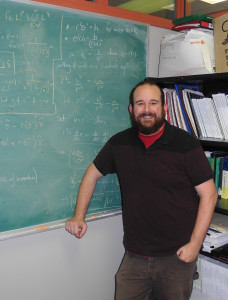Math Students Go Everywhere! Meet Dr. Scott Rodney
 For Dr. Scott Rodney, his work on partial differential equations (PDEs) is about much more than just numbers. An Associate Professor of Mathematics in Cape Breton University’s School of Science and Technology, Dr. Rodney uses functional, harmonic and classical real analysis to search for solutions. “I study classes of PDEs connected to Geometry and Physics with applications to surfaces with prescribed curvature, quasi-conformal mappings and fluid dynamics,” says Dr. Rodney.
For Dr. Scott Rodney, his work on partial differential equations (PDEs) is about much more than just numbers. An Associate Professor of Mathematics in Cape Breton University’s School of Science and Technology, Dr. Rodney uses functional, harmonic and classical real analysis to search for solutions. “I study classes of PDEs connected to Geometry and Physics with applications to surfaces with prescribed curvature, quasi-conformal mappings and fluid dynamics,” says Dr. Rodney.
Dr. Rodney’s work recently earned him another Natural Sciences and Engineering Research Council (NSERC) Discovery Grant valued at $80,000. “My research program, Degenerate Elliptic Equations: Regularity of Weak Solutions with Applications, is a current focus with the ultimate goal of extending knowledge in both pure and applied mathematics,” says Dr. Rodney.
So why are they called degenerate equations? “It’s a funny name for certain,” says Dr. Rodney, “but degenerate here means that the equations I study sit outside of standard or classical elliptic theory and require new finer techniques to understand.”
One of the things that Dr. Rodney enjoys most about working in his discipline, is that it allows him to use mathematical techniques from a wide range of topics. “From linear and abstract algebra to functional and harmonic analysis, this work allows me to explore a lot of different math in order to get the job done. And, in the end, I love to do lots of math,” says Dr. Rodney. He studies these equations in order to deduce conditions on their structure under which solutions of the equation exist and are smooth. Great mathematicians like DeGiorgi, Nash, Moser, Serrin and Trudinger are some of Dr. Rodney’s inspirations when it comes to technique.
“Math is essential in today’s scientific arena,” says Dr. Rodney. “It provides a strong foundation for logical thinking, problem-solving, and collaborative work ethics. While not for everyone, math is a constant stimulant. It surprises you, keeps you thinking, keeps you growing and it’s extremely satisfying to see results develop and to find answers to meaningful questions.”
Dr. Rodney’s research provides opportunities to both graduate and undergraduate students to work on research level mathematics in a collaborative learning environment where students get hands-on experience in reading, producing and interpreting mathematical results. Students often travel to local undergraduate conferences where they talk about their work and can network to discover new opportunities, possible collaborations and even win awards.
“It’s an amazing thing to speak at one of these conferences,” says Dr. Rodney, “students are exposed to notions of excellence from other schools and students, different research ideas and foci, presentation skills and more. But, perhaps most important of all, students find their contributions to mathematics highly valued and respected in an encouraging environment.”
Getting involved in Dr. Rodney’s research can also pay off for students financially. “Several of my student researchers have been awarded NSERC Undergraduate Student Research Awards of their own,” says Dr. Rodney. “These awards allow students to focus on research and help to hone the skills they need to be successful.”
Dr. Rodney also notes that careers involving math come with some of the highest starting salaries and levels of job/career satisfaction. Students from Dr. Rodney’s program have gone on to have successful careers in mathematics, finance, computer science, epidemiology and both secondary and post-secondary education, just to name a few.
“Students who focus on math can go on to study and accomplish almost anything. In fact, math students go everywhere!” says Dr. Rodney.
Math has certainly taken Dr. Rodney all over the world. An adjunct professor at Dalhousie University and an Affiliate at Concordia University, he lectures across North America and Italy and works with many mathematicians around the world. His next adventure awaits in Sao Carlos, Brazil where he will lecture at the ICMC Summer Conference on Differential Equations.
When asked what skills are required to be successful in math, Dr. Rodney says, “one of the great things about math is that it’s collaborative and creative by nature. It’s not all solo problem solving, calculus and counting. There’s a focus on beauty and logical argument, especially at senior levels. Math can take on almost any form from art and language to science and engineering.”
Dr. Rodney invites all interested students to inquire and see if math can fit or enhance their goals.
Where will math take you? To learn more about Dr. Rodney’s work visit his website at https://www.srodney.ca/